Take advantage of these tools and resources to help understand cystinosis better and prepare for managing your disease as you become more independent.
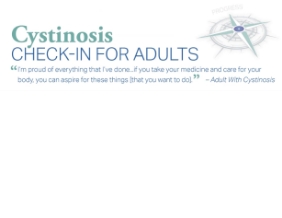

This downloadable brochure contains a brief questionnaire to track you progress over time, help you set goals, and guide you to take steps in managing cystinosis and life changes you are facing as an adult.
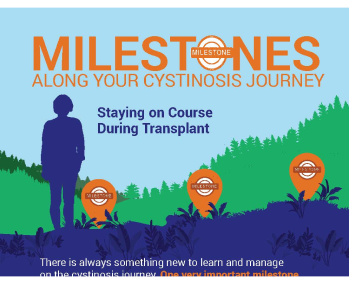
Whether you are getting ready for your first kidney transplant, or you have been through one before, use this guide to feel better prepared and informed.
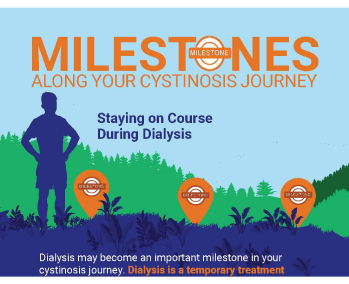
Dialysis may become an important milestone in your cystinosis journey. Use this guide to feel better prepared and informed and get helpful ideas on how to stay positive.
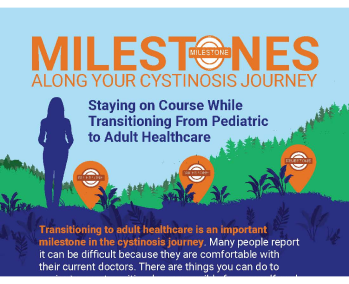
Transitioning to adult health care is an important milestone in the cystinosis journey. There are things you can do to help navigate your transition, be responsible for yourself, and maintain independence.
Do you or your child ever get tired of explaining to others what cystinosis is and how it affects you? Here is a video called, “I Live with Cystinosis” you can share with others to do the explaining for you or your child!
Share video[MUSIC] Light, unobtrusive background music
[PATIENT] I live with cystinosis. It’s a rare genetic disorder affecting only about 500 to 600 people in the United States.
I am rare. And guess what? So are you! Not many people get to meet a person with cystinosis!
I want you to know about my symptoms and side effects that happen because of my disease and the medicine I take to treat it. Fortunately, cystinosis can be managed.
I experience sensitivity to light. Cystinosis causes cystine crystal formation in my eyes. I often wear sunglasses to help with the light.
I am sensitive to heat because cystinosis impairs my ability to sweat. I try not to be too active in warm rooms or when it’s hot outside.
I may have to miss out on things if I have doctor appointments, if I’m feeling sick, or when serious things come up and I have to go to the hospital.
I sometimes experience low energy levels. Snacking frequently during the day helps.
I sometimes experience near-constant thirst because cystinosis causes dehydration.
I carry a water bottle and I have to go to the bathroom frequently.
I know it’s really important for me to take my medicine. But sometimes the medicine causes me to have bad breath or body odor. I eat mints, chew gum, or apply essential oils to try to help.
I work hard to manage my disease and have since I was a little kid. It’s important that I take my medicine on time and I really try to never miss a dose. If you have any questions about what my life is like or what I am dealing with, please just ask! I want you to know about me and my life with cystinosis. Thank you for letting me share this with you.
I have cystinosis but it does not define me!
[AUDIO] Sound effect when the “i” is standing in front of final frame

The self-care project is your guide to help you realize your full potential physically, mentally, and emotionally. Self-care is the best care. That’s why it’s important to challenge yourself by setting goals, improving your overall well-being, and finding motivation.
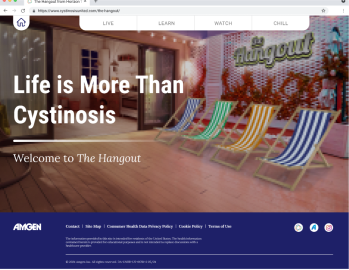
The Hangout is a place where your teens can go to help figure out life with and beyond cystinosis. They can get motivation, tips, and inspiration.
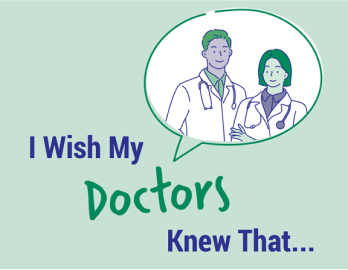
Provide this handout to your family and friends to help them better understand cystinosis and support your needs.

Provide this handout to your family and friends to help them better understand cystinosis and support your needs.
Sometimes medical terms can be tough to understand. But learning the words used to talk about cystinosis may help you be clear with doctors, family, and friends. This glossary is a great place to start.
Amino acid: A building block of proteins used in every cell to help the body grow.
Cystine: The amino acid that builds up inside of cells when a person has cystinosis.
Cystine-depleting therapy (CDT): A treatment that works to reduce the buildup of cystine in cells. Learn how taking a CDT as prescribed may help keep cystine levels low around the clock.
Cystine level test: A blood test that measures the amount of cystine in white blood cells at a given time. There are two tests that can measure cystine levels: mixed leukocytes and granulocytes.
Dialysis: A medical treatment to clean the blood when the kidneys do not work as they should.
Fanconi syndrome: A kidney disorder that causes the body to lose important substances needed for good health. It causes extreme thirst and frequent peeing (urination).
Granulocyte: A type of white blood cell that is collected in a blood sample during cystine level testing.
Hypothyroidism: A condition in which the thyroid gland is unable to make enough thyroid hormone, causing the body to not work like it should. Common symptoms include, but are not limited to, slowed growth, tiredness, and weight gain.
Immune system: A group of cells that protect the body against attacks by germs.
Infertility: Inability to cause pregnancy (for men) or inability to get pregnant (for women). Women of childbearing age with cystinosis may become pregnant.
Kidney transplant: A surgery to place a healthy kidney from a donor into the body of a person with failing kidneys.
Leukocytes: Commonly referred to as white blood cells; a collection of cells that help the body fight infections. One of the two available cystine level tests collects leukocytes in a blood sample.
Lysosome: The part of a cell that acts as a “recycling center” by breaking down proteins into amino acids. This is the part of the cell where cystine becomes trapped and builds up in people with cystinosis.
Myopathy: A disease that affects the muscles, making a person feel very weak.
Nephropathic cystinosis: Cystinosis of the kidney; often called classic infantile cystinosis because its symptoms usually appear within a child's first year of life. This is the most common (95% of all cases) and most severe form of cystinosis.
Photophobia: In patients with cystinosis, a buildup of cystine in the eyes may result in light sensitivity, or the eye's inability to tolerate light. It may also cause eye pain and severe headaches.
Rickets: Softening and weakening of bones in children, usually caused by a lack of vitamin D (phosphate) in the body.
White blood cells (WBCs): Also called leukocytes; a collection of cells that help the body fight infections.
You are not alone. The resources below may help you meet others living with cystinosis, learn about advocacy programs, explain what cystinosis is, and much more.
Global Genes is a nonprofit advocacy organization for patients and families fighting rare and genetic diseases, including cystinosis. Its mission is to eliminate the challenges of rare disease.
An independent kidney patient organization, AAKP is dedicated to improving the lives and outcomes of kidney patients through education, advocacy, patient engagement, and patient communities.
Learn moreCRF supports research that aims to improve the quality of life of patients with cystinosis, find better treatments, and ultimately find a cure.
Learn moreDPC is a patient-led, nonprofit organization dedicated to improving dialysis patients’ quality of life by advocating for favorable public policy.
Miracle Flights is a nonprofit health and welfare organization providing financial assistance for medical flights so that seriously ill children may receive life-altering, life-saving medical care and second opinions from experts and specialists throughout the United States.
CRN is an all-volunteer, nonprofit organization dedicated to supporting and advocating for research, providing family assistance, and educating the public and medical communities about cystinosis.
The Cystinosis Foundation of New Jersey is a nonprofit advocacy organization devoted to increasing awareness of cystinosis and funding medical research related to treating and curing those with the condition.
AKF is a nonprofit organization serving the millions of Americans with kidney disease. American Kidney Fund helps people fight kidney disease and live healthier lives by providing a wide range of programs and services, including prevention activities, educational resources, and financial assistance.
Learn moreDiscover the many ways Amgen has supported people with cystinosis in Committed to the Cystinosis Community.